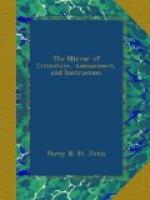Goodness of temper may be defined, to use the happy imagery of Gray, “as the sunshine of the heart.” It is a more valuable bosom-attendant under the pressure of poverty and adversity, and when we are approaching the confines of infirmity and old age, than when we are revelling in the full tide of plenty, amid the exuberant strength and freshness of youth. Lord Bacon, who has analyzed some of the human accompaniments so well, is silent as to the softening sway and pleasing influence of this choice attuner of the human mind. But Shaftesbury, the illustrious author of the Characteristics, was so enamoured of it, that he terms “gravity (its counterpart,) the essence of imposture;” and so it is, for to what purpose does a man store his brain with knowledge, and the profitable burden of the sciences, if he gathers only superciliousness and pride from the hedge of learning? instead of the milder traits of general affection, and the open qualities of social feelings. I remember, when a youth, I was extremely fond of attending the House of Commons, to hear the debates; and I shall never forget the repulsive loftiness which I thought marked the physiognomy of Pitt; harsh and unbending, like a settled frost, he seemed wrapped in the mantle of egotism and sublunary conceit; and it was from the uninviting expression of this great man’s countenance, that I first drew my conceptions as to how a proud and unsociable man looked. With very different emotions I was wont to survey the mild but expressive features of his great opponent, Fox: there was a placidity mixed up with the graver lines of thought and reflection, that would have invited a child to take him by the hand; indeed, the witchcraft of Mr. Fox’s temper was such, that it formed a triumphant source of gratulation in the circle of his friends, from the panegyric of the late Earl of Carlisle, during his boyish days at Eton, to the prouder posthumous circles of fame with which the elegant author of The Pleasures of Memory, has entwined his sympathetic recollections. The late Mr. Whitbread, although an unflinching advocate for the people’s rights, and an incorruptible patriot in the true sense of the word, was unpopular in his office as a country magistrate, owing to a tone of severity he generally used to those around him. The wife of that indefatigable toiler in the Christian field, John Wesley, was so acid and acrimonious in her temper, that that mild advocate for spiritual affection, found it impossible to live with her. Rousseau was tormented by such a host of ungovernable passions, that he became a burden to himself and to every one around him. Lord Byron suffered a badness of temper to corrode him in the flower of his days. Contrasted with this unpleasing part of the perspective, let us quote the names of a few wise and good men, who have been proverbial for the goodness of their tempers; as Shakspeare, Francis I., and Henry IV. of France; “the great and good Lord Lyttleton,” as he is called to




